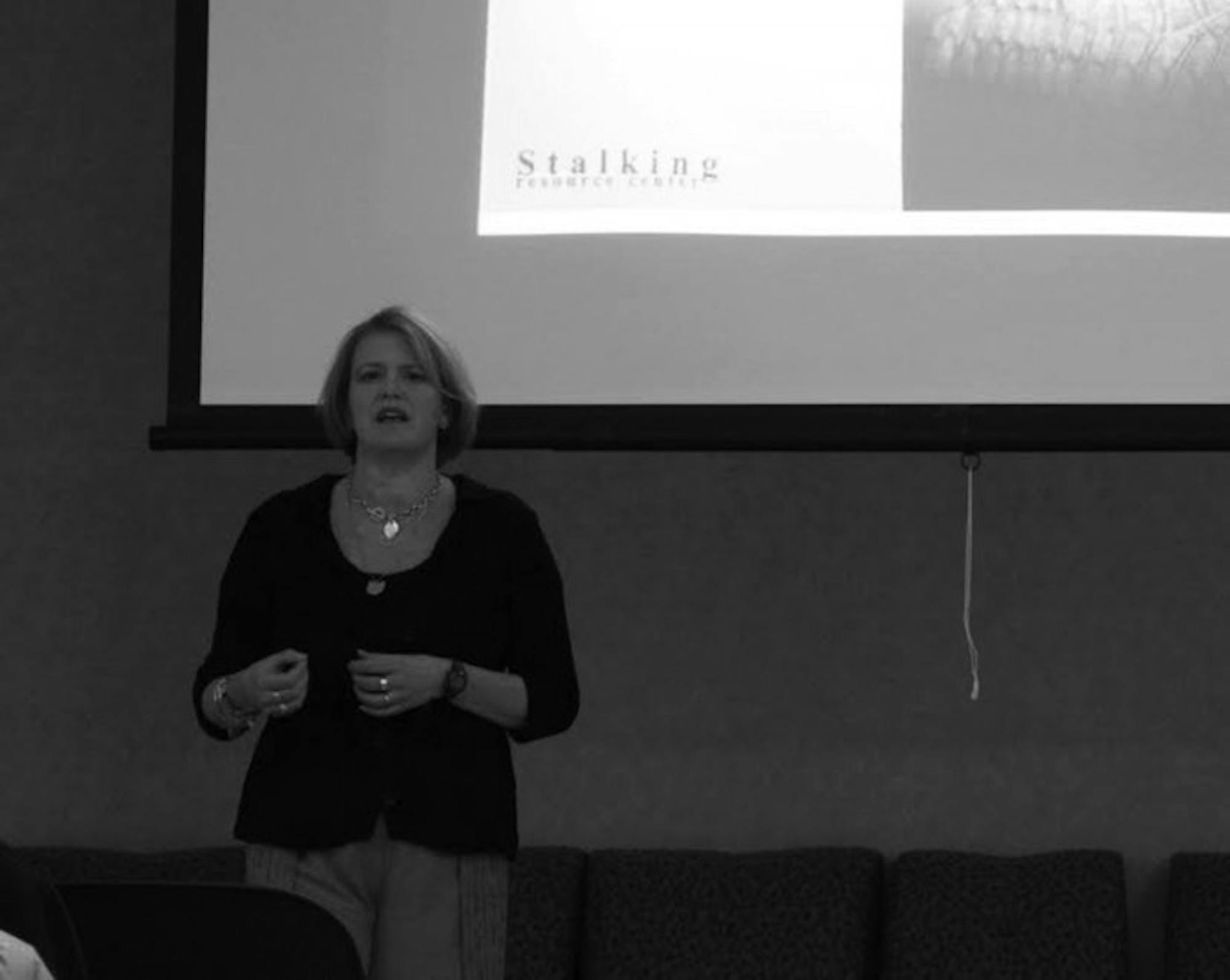Debbie Riddle spoke Tuesday evening at Rice Commons about the crime that took her sister’s life: stalking. As a national speaker for stalking awareness, Riddle shared her sister’s experience and the steps she has taken since to prevent such as story from repeating itself in a lecture sponsored by Saint Mary's Belles Against Violence Office (BAVO). 
Riddle said 7.5 million people in the United States experience stalking, but many cases are not reported.
“The majority of stalking happens between the ages of 18 to 24, the college population ... and the majority of victims know their stalker,” Riddle said.
Debbie Riddle’s younger sister, Peggy Klinke, met a man in 1998 when she was 28 years old and taking college classes to prepare for medical school. Three years of an emotionally and psychologically abusive relationship followed, Riddle said.
Riddle said she began to see negative signs in the relationship when the man showed up uninvited at a family function.
“If you have brothers and sisters, trust your guts,” Riddle said. “Because my gut feeling when I saw that man standing on the front porch of my mother’s house, and I turned and saw the look on my sister’s face, I knew in an instant this was not a good thing.”
When Peggy ended the relationship, the man proceeded to stalk her, Riddle said.
Riddle said the stalking experienced by Peggy began as noncriminal behaviors, including excessive phone calls and text messages, surveillance by the ex-boyfriend outside of Peggy’s work and a surprise proposal. These behaviors escalated over time, with the man spray-painting a crude phrase about Peggy on her mother’s garage doors, hanging up inappropriate posters about Peggy around town and committing arson by burning down Peggy’s boyfriend’s house.
“When you see how the pattern tends to build and escalate over time, and how that pattern, the one specific reason for those behaviors is to induce fear in someone, that’s when it can be identified as illegal,” Riddle said. “Stalking is illegal in all 50 states. It is a crime.”
Riddle said despite numerous reports of the man’s behaviors, the police told Peggy to wait until ‘something happens.’ Eventually a trial was scheduled and then postponed for five to six months. For her protection, Peggy and her boyfriend left New Mexico to hide in California.
On Jan. 18, 2003, three weeks before the trial, the man found Peggy, Riddle said.
“When the police show up at 10 p.m. on a Saturday night in my mother’s neighborhood, it is not good news,” Riddle said. “All I needed was to see the shoulder of the law enforcement officer standing on my mother’s porch to know that my sister was dead. That’s all I needed to see.”
Law enforcement told Riddle that Peggy was trapped in a closet when the ex-boyfriend shot her in the back of the head and then shot himself, she said.
“Being the oldest, I became the family representative,” Riddle said. “People want to know what happened, but nobody wants to ask. As people were coming in and out of the house over the next several days, I began telling that story and what had gone on and what had transpired. I realized this telling of the story was making me heal, just a little bit.”
Two weeks after Peggy’s death, Riddle began taking steps to protect other women and men from stalking. The beginning of the process was when she contacted the director of Stalking Resource Center.
“Six weeks into this, we have the Stalking Resource Center, the National Center for Victims of Crime, Erin Brockovich and Lifetime Television, the State Representative from New Mexico where Peggy resided, all on board,” Riddle said. “We decided to do something about this, to start talking about this, to start education.”
Riddle said six months after Peggy’s death and after a congressional briefing in Washington, D.C., January was identified as National Stalking Awareness Month. Riddle continues to travel as a national speaker on stalking awareness in order to educate the general public on stalking and the reforms necessary for the protection of stalking victims.
“The change had to come from both sides of the fence,” Riddle said. “You cannot just point your finger at law enforcement and say do your job better. Law enforcement needed to be educated, but the general public needs to be educated as well. If you cannot define what is happening to you, then you cannot define the crime, you will not report it. If law enforcement isn’t trained, they cannot help you. ... You can go one way. You can be angry, hateful, bitter for the rest of your life, because that’s a choice. Or you can do something about this. And I decided I wanted to do something about it.”













